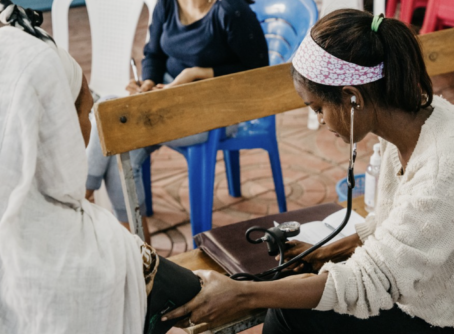
Mental illness among young people has been on the rise for years, a trend exacerbated by the COVID-19 pandemic. To make matters worse, there is a nationwide mental health care provider shortage preventing youth from accessing the care that they need.
From Illinois to Wisconsin to Oregon, state health systems are straining under the weight of high demand. Families face long wait times, prohibitive costs and far distances to in-patient care facilities. Schools, which are often the first to catch mental health concerns among young people, are losing crucial staff due to high resignation rates.
This situation has created the perfect storm for a youth mental health crisis.
Marginalized communities are being hit especially hard. According to a 2021 CDC survey, Black and American Indian/Alaska Native youth were more likely to have attempted suicide than other groups. This figure echoes research that shows that inequality, racism, poverty and violence leads to poorer mental health outcomes for marginalized youth.
Mental health is intertwined with the health of society as a whole. At the heart of the current crisis is American society’s failure to be led by justice and mercy, to prioritize the well-being of young people and to honor every human being’s multidimensional needs.
In order to love all our neighbors effectively, Christians must advocate for and be part of an all-hands-on-deck response to the youth mental health crisis. We must animate the whole society, including government and civil society, to care for the whole person.
A Public Justice Approach
The Christian tradition honors the needs of both the body and the mind. Far from dismissing mental well-being as a secondary concern, Scripture consistently pays close attention to people’s emotional lives, including Jesus’s own. Throughout the Gospels, Jesus expresses sadness, fear, desperation and anguish — as the famous verse goes, “Jesus wept” (John 11:35).
This is not to say that Scripture directly speaks to mental illness as we understand it today; biblical writers understood the human mind according to their own historical context, not ours. But the fact that Jesus, God Incarnate, experienced a full range of emotions indicates that Christians should take the emotions of those made in His image seriously.
This is critical when it comes to young people. At a vulnerable time in their development, children and youth need special support in order to thrive and be set up for a life of sustainable mental well-being. Much of the time, this support comes from the cultivation of safe environments where youth can grow and learn and play. But many young people also need professional intervention due to clinical mental illness diagnoses.
To comprehensively care for young people, various sectors of society must work together. According to the Center for Public Justice’s Guidelines, the government is obligated to support families, especially during the childbirth and childrearing periods. To do so effectively, the government must make mental health care accessible to all families, especially those who cannot afford private services.
This can look like allocating more funding to care providers or ensuring that each school has an adequate number of mental health professionals on-site. It can also look like funding education grants for mental health care professionals, especially those in urban and rural settings, to ease the burden on those already in the field.
In addition to boosting the capacity of existing systems to respond to crises, the government should invest more in preventative mental health care to sustainably foster wellness among the entire population. California has already begun to explore this approach by providing grants to community wellness centers and evidence-based mindfulness programs in schools. Other states can do the same.
Institutions outside of government also play an important role in solving the current crisis. Primary care providers can incorporate more routine mental health screening into pediatric care, as one Philadelphia hospital has done. Nonprofit organizations, especially after-school clubs and youth centers, can directly educate young people on how to care for their mental health. Churches, which are sometimes on the frontlines of responding to mental health crises, can pursue first responder training for youth ministry staff and provide communal belonging for families of struggling youth. Families can seek out educational resources and reduce mental health stigma through open conversations at home. They can also make small choices that lead to a greater sense of well-being and connectedness for youth; limiting family technology use and volunteering with kids are just two ways to do so.
There’s no doubt that the youth mental health crisis is overwhelming and alarming. But for those who want to be a part of a just response, there are many ports of entry for action. Whether by pushing for policy change or learning more about mental illness or directly supporting families in their communities, Christians can help build a society that better meets the needs of young people.
Ezra Craker was a Shared Justice intern in the Spring of 2023. He graduated from Calvin University in May with a BA in Political Science and English.





